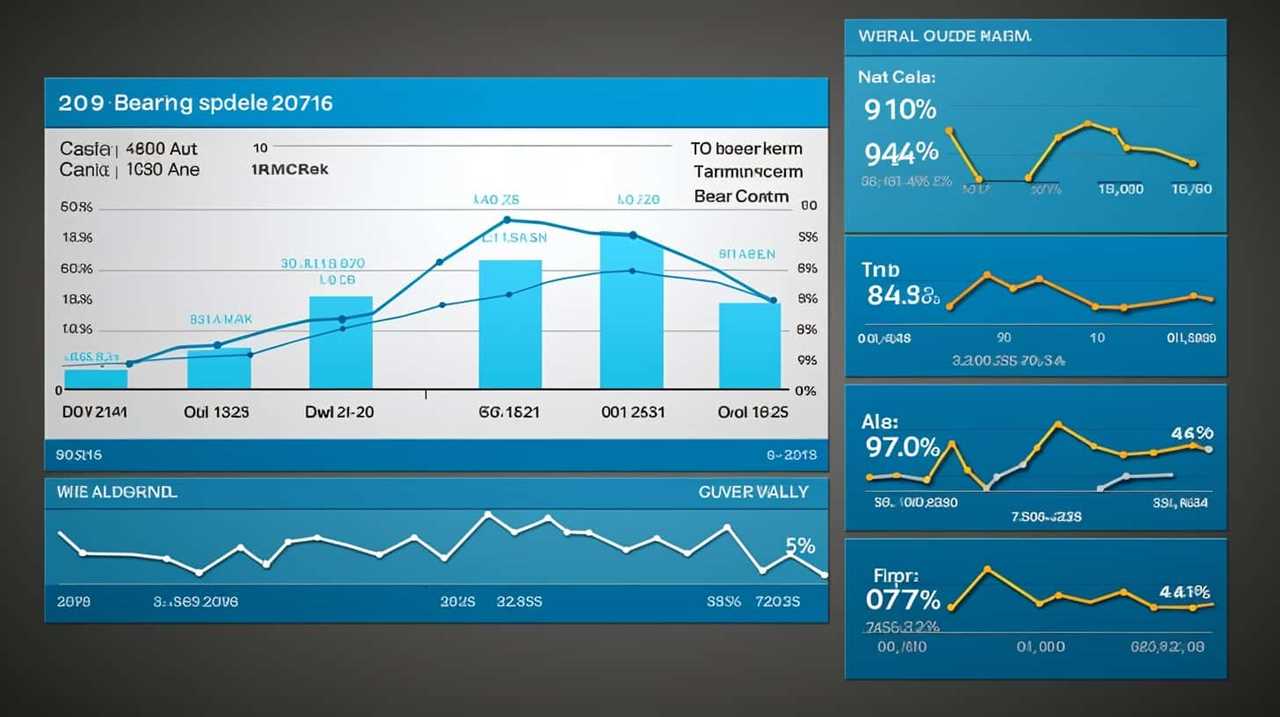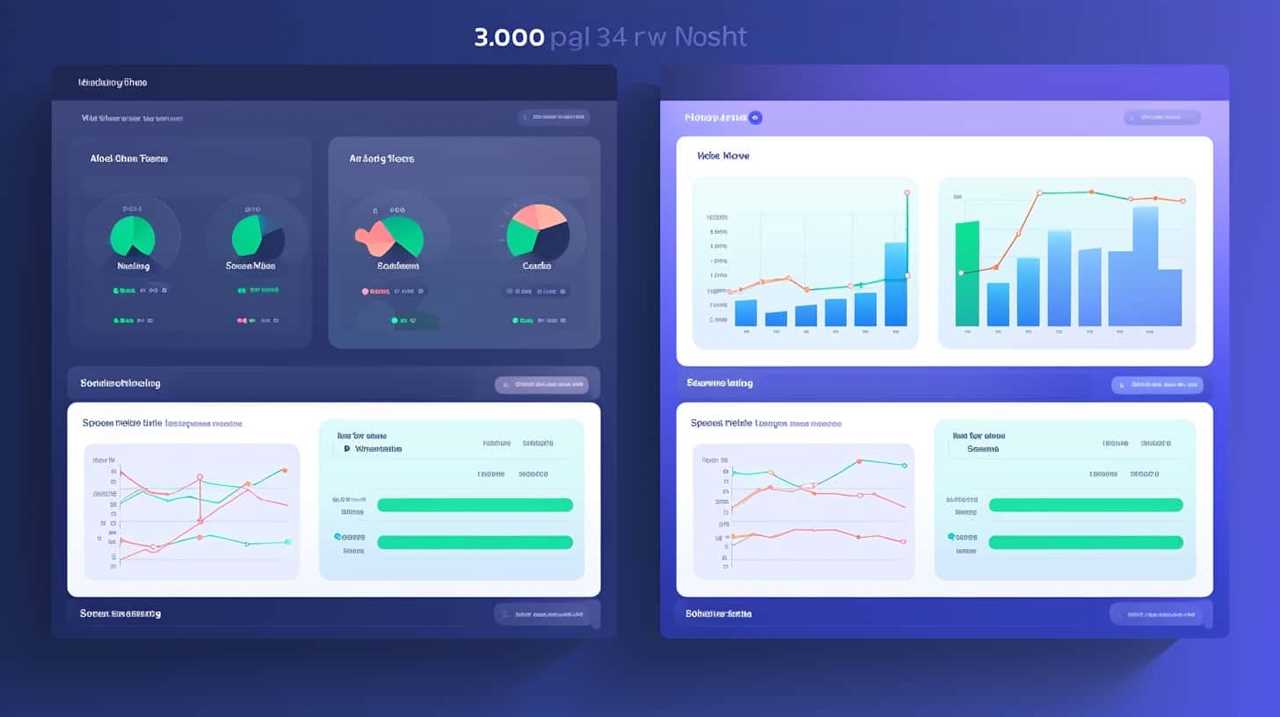Ah, the enchantment of keywords! They hold the key to attaining SEO triumph and ruling the digital realm.
In our quest for mastery, we must recognize the critical role of keyword research. It’s not just about picking random words; it’s about understanding what users truly want and tailoring our content accordingly.
Join us on this journey as we delve into the art of effective keyword research, uncover hidden opportunities, and refine our strategies for SEO success.
Let’s dive in and conquer the search engine landscape together!

Key Takeaways
- Targeting high volume keywords drives organic traffic to the website.
- Identifying keywords with high search volumes improves visibility and brand exposure.
- Keyword research is valuable for PPC campaigns, maximizing ad spend and targeting the right audience.
- Understanding search intent is crucial for effective keyword research.
The Importance of Keyword Research
Keyword research plays a crucial role in our journey towards SEO stardom. Targeting high volume keywords is essential for driving organic traffic to our website. By identifying the keywords that have high search volumes, we can optimize our content and increase our chances of ranking higher in search engine results. This not only helps us attract more visitors but also improves our visibility and brand exposure.
Additionally, keyword research isn’t limited to SEO alone. It’s equally valuable for PPC campaigns, where utilizing keyword research enables us to target the right audience and maximize our ad spend. By understanding the intent behind popular search queries, we can create compelling ads that resonate with our target market, leading to higher click-through rates and conversions.
Mastering the art of keyword research is key to achieving SEO success and maximizing the effectiveness of our PPC campaigns.
How to Conduct Effective Keyword Research
When it comes to conducting effective keyword research, there are a few key points to keep in mind.

First, utilizing tools for keyword research can provide valuable insights into search volume and competition.
Second, it’s crucial to identify search intent, as this helps to align your content with what users are looking for.
Lastly, optimizing for long-tail keywords can be a strategic approach to target more specific and less competitive search queries.
Tools for Keyword Research
We rely on a variety of powerful tools to conduct effective keyword research for SEO. These tools help us uncover valuable insights about the keywords that users are searching for, allowing us to optimize our content and improve our website’s visibility in search engine results.

Here are three of the best keyword research tools that we use:
- Google Keyword Planner: This tool provides us with keyword ideas, search volume data, and competition levels. It helps us identify relevant keywords and understand their potential impact on our SEO efforts.
- SEMrush: With its comprehensive keyword research capabilities, SEMrush allows us to analyze competitor keywords, track rankings, and discover new keyword opportunities. It also provides valuable insights into search trends and keyword difficulty.
- Ahrefs: Ahrefs helps us identify valuable keywords by providing detailed data on search volume, keyword difficulty, and click-through rates. Its comprehensive keyword research features enable us to uncover profitable keyword opportunities and stay ahead of the competition.
Identifying Search Intent
To effectively conduct keyword research, it’s crucial to understand the search intent of users. Search intent analysis involves determining the underlying motivation behind a user’s search query. By understanding what users are looking for, we can optimize our keywords to match their intent and provide relevant content.
This is where keyword intent optimization comes into play. It involves aligning our keywords with the specific intent of users, whether it’s informational, navigational, commercial, or transactional.
Long-Tail Keyword Optimization
Now that we’ve understood the importance of aligning keywords with user intent, let’s delve into the world of long-tail keyword optimization and how it can be effectively conducted for achieving SEO success. Long-tail keywords are longer and more specific keyword phrases that target niche markets. They’re essential for increasing organic traffic and driving more qualified leads to your website.

Here are three key steps to conducting effective long-tail keyword research:
- Understand your target audience: Research your audience’s pain points, interests, and search habits to identify relevant long-tail keywords that align with their needs.
- Use keyword research tools: Utilize tools like Google Keyword Planner, SEMrush, or Ahrefs to identify long-tail keywords with low competition and high search volume.
- Optimize your content: Incorporate long-tail keywords naturally into your website content, including titles, headers, meta descriptions, and body text. This will improve your website’s visibility in search engine results and attract more targeted traffic.
Understanding User Intent in Keyword Research
Our first step in understanding user intent in keyword research is to analyze the search queries and behaviors of our target audience. By identifying user behavior and conducting keyword intent analysis, we can gain valuable insights into what our audience is looking for and tailor our content to meet their needs.
User behavior refers to the actions and patterns exhibited by users when they search for information online. By analyzing these behaviors, we can determine whether users are seeking information, looking to make a purchase, or simply browsing.
Keyword intent analysis involves examining the intent behind specific keywords to understand what users are hoping to achieve when they search for those terms. This information is crucial for optimizing our content and ensuring that it aligns with the needs and expectations of our target audience.

Long-Tail Keywords: Unlocking Hidden Opportunities
By analyzing user behavior and conducting keyword intent analysis, we can uncover hidden opportunities through the use of long-tail keywords. Long tail keyword research allows us to dive deeper into specific queries and understand the intent behind them.
Here are three reasons why long tail keyword targeting is crucial for unlocking hidden opportunities:
- Less competition: Long-tail keywords often have lower search volumes, which means there’s less competition for those specific keywords. This presents an opportunity to rank higher and drive targeted traffic to your website.
- Higher conversion rates: Long-tail keywords are usually more specific and indicative of a user’s intent. By targeting these keywords, you can attract users who are further along in the buying process, resulting in higher conversion rates.
- Enhanced relevance: Long-tail keywords allow you to create highly relevant content that matches exactly what users are searching for. This not only improves your website’s visibility but also enhances the user experience.
Understanding the importance of long tail keyword research and targeting is just the beginning. Now, let’s explore the tools and techniques for effective keyword research.
Tools and Techniques for Keyword Research
To begin our exploration of keyword research tools and techniques, let’s delve into the various methods for uncovering valuable keywords.

When it comes to tools for keyword analysis, there are several options available. One popular tool is Google Keyword Planner, which provides insights into search volume and competition for specific keywords. Another useful tool is SEMrush, which not only helps identify keywords but also provides valuable data on competitors’ keyword strategies.
As for techniques for identifying user intent, it’s crucial to understand the needs and motivations of your target audience. Conducting thorough competitor analysis and utilizing tools like Google Trends can also help you gain insights into what users are searching for.
Analyzing Competitor Keywords for SEO Advantage
When it comes to SEO, analyzing competitor keywords can provide valuable insights into their strategies and help us optimize our own keyword selection.
By uncovering the keywords that our competitors are targeting, we can identify opportunities to improve our rankings and gain a competitive advantage.

This analysis allows us to understand what keywords are working for our competitors and how we can leverage them to enhance our own SEO efforts.
Uncovering Competitor Strategies
We frequently analyze our competitors’ keywords to gain a strategic advantage in SEO. Unveiling competitor tactics allows us to understand their strengths and weaknesses, enabling us to refine our own strategies. By gaining a competitive edge, we can optimize our content and website to outrank them in search engine results pages (SERPs).
Here are three key benefits of analyzing competitor keywords:
- Identifying lucrative keyword opportunities: By analyzing competitors’ keywords, we can identify high-performing keywords that we may have overlooked. This helps us optimize our content for relevant search terms that have the potential to drive more organic traffic.
- Understanding competitor content gaps: Analyzing competitor keywords reveals the topics and areas they’re targeting. This allows us to identify content gaps and create comprehensive, valuable content that meets the needs of our target audience.
- Benchmarking against industry leaders: Studying competitor keywords helps us benchmark our performance against industry leaders. By analyzing their strategies, we can identify areas for improvement and implement effective tactics to surpass their rankings.
Analyzing competitor keywords is an essential aspect of effective SEO strategy, providing valuable insights for optimizing our website and content.

Optimizing Keyword Selection
Analyzing competitor keywords allows us to optimize our keyword selection and gain a competitive advantage in SEO. By studying the keywords that our competitors are targeting, we can identify gaps in their strategy and leverage them to our advantage.
To maximize our keyword potential, we need to employ effective keyword optimization techniques. This involves conducting thorough research to identify high-volume and low-competition keywords that are relevant to our industry. We can then strategically incorporate these keywords into our website content, meta tags, and other SEO elements.
By doing so, we increase our chances of ranking higher in search engine results and attracting more organic traffic.
Now that we understand the importance of optimizing keyword selection, let’s explore the next section about keyword research for local SEO success.

Keyword Research for Local SEO Success
To achieve local SEO success, conducting thorough keyword research is crucial. Local search optimization plays a significant role in helping businesses connect with their target audience in specific geographic areas. When it comes to keyword research for local SEO, here are three effective strategies to consider:
- Location-specific keywords: Incorporate keywords that include the name of the city, neighborhood, or region where your business operates. This helps search engines understand the geographical relevance of your content and improves your chances of appearing in local search results.
- Long-tail keywords: Focus on longer, more specific keyword phrases that reflect the intent of users searching for local services or products. Long-tail keywords have less competition and can attract highly targeted traffic to your website.
- Competitor analysis: Study the keywords your competitors are targeting and identify any gaps or opportunities. This can help you refine your keyword strategy and discover untapped local markets.
The Role of Keyword Research in On-Page Optimization
Keyword research plays a pivotal role in optimizing on-page content for maximum SEO impact. It not only helps us understand what users are searching for but also informs us about the relationship between keyword research and user experience.
By identifying the keywords that are most relevant to our target audience, we can create content that aligns with their needs and preferences. This, in turn, improves the overall user experience on our website.
Additionally, keyword research has a significant impact on website architecture. It helps us organize our content in a way that’s logical and user-friendly, making it easier for search engines to crawl and understand our website.

Keyword Research for Content Creation and Blogging
When it comes to content creation and blogging, keyword research plays a crucial role in optimizing our content for SEO.
By finding relevant keywords that align with our target audience’s search queries, we can ensure that our content is discoverable and ranks higher in search engine results.
Finding Relevant Keywords
Our team’s primary focus in content creation and blogging is identifying the most relevant keywords to optimize search engine rankings. Finding relevant keywords is crucial for attracting the right audience and increasing organic traffic.
Here are three key points to consider when conducting keyword research for content creation and blogging:

- Keyword research techniques for e-commerce websites – For e-commerce websites, it’s essential to target keywords that are specific to your products or services. Conducting competitor analysis and using tools like Google Keyword Planner can help identify relevant keywords with high search volumes and low competition.
- Keyword research for mobile app optimization – Mobile app optimization requires a different approach to keyword research. It’s important to focus on long-tail keywords that are relevant to your app’s features, functionality, and target audience. Additionally, analyzing user reviews and feedback can provide valuable insights into the keywords that users are using to find similar apps.
- Stay updated with keyword trends – Keyword trends are constantly evolving, and it’s crucial to stay updated with the latest trends in your industry. Regularly conduct keyword research to identify new trending keywords and incorporate them into your content strategy to stay ahead of the competition.
In the next section, we’ll discuss the importance of optimizing content for SEO and how it can further enhance your search engine rankings and visibility.
Transition: Now that we’ve identified the most relevant keywords, let’s explore how to optimize our content for SEO.
Optimizing Content for SEO
Now we can enhance our search engine rankings and visibility by optimizing our content for SEO. Optimizing content involves various strategies, such as incorporating relevant keywords, optimizing website speed, and implementing effective link building strategies. By doing so, we can improve our website’s performance and attract more organic traffic.
Keyword research plays a crucial role in content creation and blogging. It helps us identify the keywords that our target audience is searching for and allows us to create content that meets their needs. Additionally, optimizing website speed is essential for user experience and search engine rankings. Slow-loading websites can negatively impact our SEO efforts, as search engines prioritize fast-loading sites.

In the table below, we can see how optimizing website speed and implementing link building strategies can improve our SEO performance:
| Optimization Strategy | Impact on SEO |
|---|---|
| Optimizing website speed | Improved user experience, higher search engine rankings |
| Link building strategies | Increased website authority, higher search engine rankings |
Incorporating Keywords in Metadata and URLs
Incorporating keywords in the metadata and URLs plays a crucial role in enhancing our website’s SEO performance. It helps search engines understand the content and relevance of our web pages. Here are three key reasons why this practice is essential:
- Incorporating keywords in anchor text: When creating hyperlinks, using relevant keywords in the anchor text helps search engines determine the content of the linked page. This boosts the page’s visibility and improves ranking potential.
- Optimizing images with keywords: Adding descriptive keywords to image file names, alt tags, and captions helps search engines understand the visual content. This increases the chances of appearing in image search results and drives more organic traffic to our website.
- Optimizing URLs: Including relevant keywords in our page URLs provides both users and search engines with valuable information about the page’s content. It improves the page’s visibility and makes it more likely to rank higher in search results.
Tracking and Refining Your Keyword Strategy
To successfully achieve SEO stardom, we must track and refine our keyword strategy.
Tracking keyword trends is crucial in understanding what terms and phrases are popular among our target audience. By analyzing search volume and competition for specific keywords, we can identify opportunities to optimize our content and improve our search engine rankings.

Refining keyword targeting involves continuously evaluating and adjusting our keyword strategy based on data and performance metrics. This includes monitoring keyword rankings, click-through rates, and conversion rates to determine the effectiveness of our chosen keywords.
Additionally, staying up-to-date with industry trends and changes in search algorithms allows us to adapt our keyword strategy accordingly.
Frequently Asked Questions
How Does Keyword Research Impact Website Rankings in Search Engine Results?
Keyword research plays a crucial role in determining website rankings in search engine results. By understanding the relationship between keyword research and user intent, we can optimize our content to align with what users are searching for, boosting our SEO performance.
Can Keyword Research Help Improve Website Traffic and Conversion Rates?
Keyword research is crucial for improving website traffic and conversion rates. By identifying long tail keywords, we can drive targeted traffic to our site. We optimize our content based on keyword research insights, ensuring maximum visibility in search engine results.

What Are the Common Mistakes to Avoid When Conducting Keyword Research?
When conducting keyword research, it’s crucial to avoid common mistakes. By following keyword research best practices and utilizing effective tools for keyword research, we can optimize our chances of achieving SEO stardom.
Is It Necessary to Update Keyword Research Regularly to Stay Competitive?
Yes, we must regularly update keyword research to stay competitive. Long tail keywords are important in keyword research because they target specific user intent. Competitor analysis plays a crucial role in identifying keyword opportunities and staying ahead.
Are There Any Ethical Considerations to Keep in Mind When Using Keyword Research for SEO Purposes?
When it comes to keyword research for SEO, ethical considerations are crucial. We must balance our SEO strategy with user intent, ensuring that we provide valuable and relevant content while optimizing for search engines.
Conclusion
In conclusion, keyword research is the key to achieving SEO stardom. It allows us to understand user intent, unlock hidden opportunities with long-tail keywords, and optimize our on-page content.

By incorporating keywords in metadata and URLs, we can further enhance our search visibility. With the right tools and techniques, we can track and refine our keyword strategy to stay ahead of the competition.
So, let’s embark on this journey of keyword research and reach new heights in the SEO universe!










